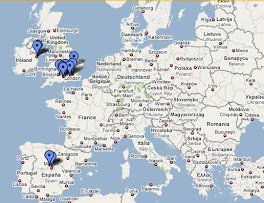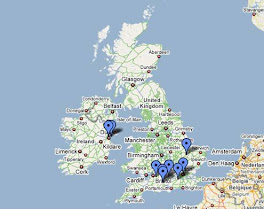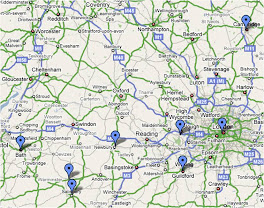Sleeping like logs during the night, my alarm awoke Craig and I much too early the next morning. Accustomed to the waste-no-minute mentality of traveling, I hopped out of my bed the moment my alarm started beeping. Leaving Craig to snooze for an extra half hour, I enjoyed a hot shower and dressed for the busy day ahead. Snoring like a baby, Craig eventually stirred as I rummaged through my bag looking for a pair of clean socks.
"Good morning, sleepyhead," I cooed. "You need to get up so that we don't miss mass at Westminster Cathedral."
Sleepily rolling out of his bed, Craig dragged his feet to the shower and was ready in half the time it took me to wash up. Repacking our bags, we dragged our suitcases back down to the storage closet in the hostel basement before eating a meager breakfast in the ridiculously crowded dining room. "Better get milk for your cereal," Craig warned. "They're almost out, and there's a hungry crowd walking down the hall."
Sprinkling the last drops of milk over my cornflakes, I joined Craig at a long table to talk about our sight-seeing plans for the day.
"First things first," I began, "we'll need to keep track of time today so that we don't miss our 8 o'clock flight to Paris. The departure gates open at 6, and we'll want to be there right on time in case there's a long line. Bill and I have had too many close calls with flight plans for me to take any chances while you're here."
"Righto," Craig agreed.
"We'll need to check out of our hostel room before leaving this morning since we won't be back until later this afternoon to pick up our bags. Since we have an hour or so to kill before mass, I think we should catch the Tube into central London to see the lions in Trafalgar Square -- there are some great photo ops there. From there, we should be close enough to walk to Westminster Cathedral for mass. After mass, we can spend a few hours at the Churchill Museum, which will be a first for both of us. If there's time afterwards, you really need to see the British Museum since it's free and positively amazing. By then, we'll probably need to head back here to grab our luggage before catching a train to Luton Airport. If all goes well, we should be in Paris shortly after nightfall."
"You're such a planner," Craig teased. "Sounds good to me. Ready to go?"
After checking out of the hostel, Craig and I endured the lengthy subway ride into London and hopped off at the nearest stop to Trafalgar Square. On a nice day, Trafalgar Square is always packed with local lunch-goers and tourists, which makes it impossible to get a good photo with the lions on the square's central monument. Knowing this, I had planned for us to see Trafalgar Square early on Sunday morning while most Londoners and others would be sleeping off Saturday night's party scene. As expected, my foresight proved right and we had the square mostly to ourselves before mass.
"Welcome to Trafalgar Square," I said gesturing to the nearby area.
"Now this makes me feel like I'm in London," Craig replied.
Circumventing the central fountain, I walked Craig to London's photogenic lions. "These are the most photographed statues in all of London," I began. "You should hop on up so that I can click a few pictures."
Hamming up the spotlight, Craig carefully climbed all over the lions trying to get some funny photos without falling off the monument. Laughing as I took photo after photo, he eventually jumped down to let a few other early-morning tourists climb around the lion's mane. Though we couldn't spend much time in Trafalgar Square, we had seen enough of the now pigeon-less neighborhood and briskly walked to Westminster Cathedral in hopes of arriving before the opening song.
Contrary to popular belief, Westminster Cathedral is not affiliated with Westminster Abbey. To clear up any confusion, Westminster Abbey belongs to the Church of England and serves as the primary burial ground for British monarchs and other members of the royal family. By contrast, Westminster Cathedral is a Catholic church that was consecrated much more recently in 1910. For Craig and I, it was basically just a fancy place to go to mass on Sunday morning.
There's not much to say about Westminster Cathedral. Mass proceeded as it would anywhere else in the world, and the church itself was not very memorable. Sparsely decorated inside, Westminster Cathedral serves its most important underlying purpose -- worship. Though this might surprise some who view cathedrals as places of overwhelming pomp and circumstance, the bareness of the church did not surprise me. In Britain, Catholic churches were humbly designed so as to not upstage the Anglican churches. After centuries of quarrelsome debate, England hasn't been able to rid itself of Catholicism, but they won't let us gloat either.
Energy lagging a bit after the solemn mass, Craig and I ducked into a cozy coffee shop for much-needed cups of caffeine. Settling into a chair with a cup of Chai, I immediately pulled out my map of London and began circling the day's remaining destinations. Checking my Rick Steve's U.K. travel guide for museum hours, I said, "Looks like we can relax for a little while until the Churchill Museum opens. Are you up for a walk?"
"Sure," Craig replied while finishing his coffee.
Walking back to Trafalgar Square, we looped around London catching glimpses of Buckingham Palace, Westminster Abbey, and Parliament. Strolling through St. James's Park, I became a little befuddled with my sense of direction and stopped to ask a London police officer to point us in the direction of the Churchill Museum.
"I believe the Churchill Museum is closed today, but I cannot be sure on the matter," the policeman kindly replied.
Worried that my plans had been unknowingly foiled, we followed the officer's directions and eventually found the entrance to the Churchill Museum and Cabinet War Rooms. Thankfully, the officer was wrong and the museum was open for its normal Sunday hours. Breathing sighs of relief, Craig and I paid the admission fee and began our self-guided audio tour of the underground Cabinet War Rooms.
During World War II, the Nazis embarked on an all-out siege of Britain's capital city. Enduring bomb after bomb from the sky, Londoners were forced to either flee the city or seek shelter in underground bomb shelters. Unwilling to abandon the city of London, Prime Minister Winston Churchill stood firm as he continued to lead from his offices in England's capital. But how did he survive the attacks from the air? And how did he manage to speak securely with world leaders while Nazi soldiers were well within range of intercepting communication signals? Why were Nazi troops never able to conquer London?
Some of these answers can be found in the underground Cabinet War Rooms. Originally covering three acres, the Cabinet War Rooms were part of an underground bunker built beneath some of London's prominent landmarks. Protected by a steel-enforced roof, the bunker served as a safe haven for the Prime Minister, his family, and over 500 government employees seeking to discover new strategies for ending the war. Listening to our audio guides, Craig and I were able to experience a typical day under Nazi attack while hearing sound bits of Churchill himself. Walking down empty corridors with dimly-lit corners, we saw Churchill's living quarters, workplaces of military strategists, and bedrooms of the Prime Minister's detectives. My favorite part of the war rooms, however, was the quirky sense of humor that Winston Churchill still managed to work into his underground bunker in a dangerous time of war. For example, the Prime Minister had a private phone line connected only to President Franklin D. Roosevelt for important conversations on sensitive war matters. With hundreds of employees floating around very tight quarters, how was Churchill able to talk to Roosevelt privately without being overheard? By installing the phone in a very private place -- his bathroom! This makes me wonder if passing-by employees were ever unnerved by Churchill's rather lengthy trips to the toilet...
Eventually reaching the end of our Cabinet War Room tour, Craig and I were greeted by one of my favorite quotes while entering the remaining Churchill Museum exhibits:
"We are all worms. But I believe that I am a glow-worm."
Not much of a WWII history buff, I had never realized before how incredibly witty Winston Churchill was as Britain's Prime Minister. Not wanting to waste such well-placed humor, the Churchill Museum was covered with various Churchill witticisms that actually united a nation during a very difficult time of war. Here's a taste of some of Churchill's best quotes:
"I may be drunk, Miss, but in the morning I will be sober and you will still be ugly."
"If you go on with this nuclear arms race, all you are going to do is make the rubble bounce."
"My most brilliant achievement was my ability to be able to persuade my wife to marry me."
"Eating words has never given me indigestion."
Laughing over Winston's quirky remarks, Craig and I eventually bade farewell to the Churchill Museum as the former Prime Minister reminded us, "I am prepared to meet my Maker. Whether my Maker is prepared for the great ordeal of meeting me is another matter."
Wednesday, July 16, 2008
Subscribe to:
Post Comments (Atom)











No comments:
Post a Comment